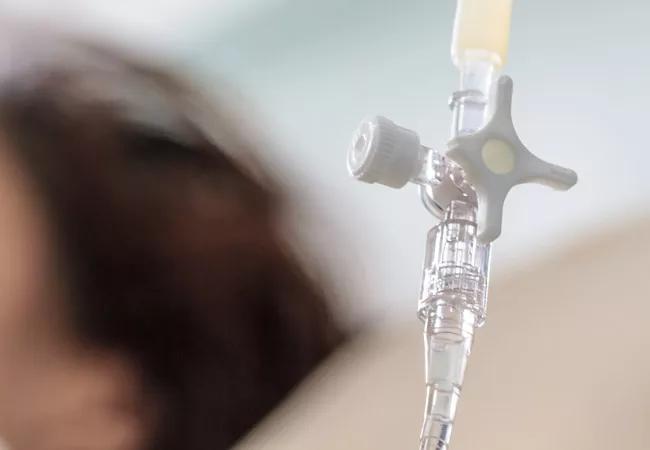Takeaway: Treatment should be localized

It’s a clinical conundrum without a clear answer: What’s the best approach for patients who undergo total mesorectal excision of Stage II-III rectal cancer based on negative node imaging, but who later turn out to harbor Stage III disease on pathology?
Advertisement
Cleveland Clinic is a non-profit academic medical center. Advertising on our site helps support our mission. We do not endorse non-Cleveland Clinic products or services. Policy
Further treatment is recommended, as long as a patient can endure it, Cleveland Clinic researchers reveal in a follow-up study presented at Digestive Disease Week 2016.
One thing is clear: “Surgery alone in these cases is not optimal,” says Luca Stocchi, MD, Clinical Research Section Head, Colorectal Surgery. “The take-home message for other physicians is that even if node positive rectal cancer is only demonstrated by the assessment of the pathology specimen and was not visible at the time of the initial imaging, postoperative treatments, at least chemotherapy, should be given when the patient can tolerate that.”
In select patients, radiation might also be warranted.
Dr. Stocchi and his colleagues identified 218 pathologically node positive (cN-/pN+) patients from a prospectively collected database. Patients were initially staged with abdominopelvic CT, transrectal endoscopic ultrasound and/or pelvic MRI. Each patient underwent total mesorectal excision (TME) without preoperative chemoradiation.
The investigators classified patients into three groups to compare outcomes: 18 patients who received no postoperative treatment; 59 others who received either chemoradiotherapy or radiation alone; and 141 controls who had neoadjuvant chemoradiation plus surgery.
Dr. Stocchi acknowledges that some clinicians remain concerned about possible increased toxicity from postoperative chemoradiation, particularly after patients undergo a low colorectal anastomosis or a coloanal anastomosis. “Hypothetically, one might argue that incidental lymph node involvement found on the pathology specimen after the initial imaging studies were negative for lymph node involvement might be associated with a small burden of disease which could be treated with surgery alone.”
Advertisement
“The results of our study are in contrast with such a hypothesis.”
Compared with patients who received any adjuvant treatment and controls, patients who only had surgery experienced significantly poorer cancer outcomes during a follow-up of at least three years.
| No Postop Treatment | Adjuvant Treatment | Neoadjuvant Therapy + Surgery | P value | |
|---|---|---|---|---|
| 5-year overall survival | 42.3% | 73.5% | 66.4% | 0.004 |
| 5-year disease-free survival | 42.8% | 67.2% | 57.3% | 0.005 |
| 5-year disease-specific survival | 54.7% | 85.7% | 74.1% | 0.021 |
| 5-year local recurrence | 16.7% | 2.1% | 9.3% | 0.211 |
| 5-year distant recurrence | 42.4% | 20.4% | 37.2% | 0.016 |
| No Postop Treatment | ||||
| 5-year overall survival | ||||
| Adjuvant Treatment | ||||
| 42.3% | ||||
| Neoadjuvant Therapy + Surgery | ||||
| 73.5% | ||||
| P value | ||||
| 66.4% | ||||
| 0.004 | ||||
| 5-year disease-free survival | ||||
| Adjuvant Treatment | ||||
| 42.8% | ||||
| Neoadjuvant Therapy + Surgery | ||||
| 67.2% | ||||
| P value | ||||
| 57.3% | ||||
| 0.005 | ||||
| 5-year disease-specific survival | ||||
| Adjuvant Treatment | ||||
| 54.7% | ||||
| Neoadjuvant Therapy + Surgery | ||||
| 85.7% | ||||
| P value | ||||
| 74.1% | ||||
| 0.021 | ||||
| 5-year local recurrence | ||||
| Adjuvant Treatment | ||||
| 16.7% | ||||
| Neoadjuvant Therapy + Surgery | ||||
| 2.1% | ||||
| P value | ||||
| 9.3% | ||||
| 0.211 | ||||
| 5-year distant recurrence | ||||
| Adjuvant Treatment | ||||
| 42.4% | ||||
| Neoadjuvant Therapy + Surgery | ||||
| 20.4% | ||||
| P value | ||||
| 37.2% | ||||
| 0.016 |
“Surgery alone was insufficient in our study population because the impact of lymph node involvement remained significant, even though the involvement of the lymph nodes could not be demonstrated by the initial imaging studies,” Dr. Stocchi says.
“My recommendation would be that such patients should have postoperative chemotherapy,” Dr. Stocchi says. The study, however, was not powered to demonstrate if postoperative chemotherapy alone is sufficient. Therefore, the use of postoperative radiation therapy could also be considered in select cases if there is major concern about local recurrence, he says.
“Cleveland Clinic has a long, tradition of treating rectal cancer as well as surgical expertise in complex cases and high-risk patients,” Dr. Stocchi says. To ensure the best possible outcomes, routine evaluation of patients with rectal cancer is incorporated into Cleveland Clinic’s tumor board. This means surgical oncologists and patients can gain from the interdisciplinary collaboration among specialists from other clinical areas relevant to rectal cancer, including medical oncology, radiation oncology, pathology, radiology and genetic counseling.
Treatment should be individualized. Specific agents would be likely discussed during the tumor board with input from a medical oncologist, “but in good-risk patients, based on the data from node positive colon cancer, it would probably involve FOLFOX,” Dr. Stocchi says.
Advertisement
In addition, “there may be practical situations in which the patient’s age, comorbidity or the onset of postoperative complications prevent the optimal use of such adjuvant treatments,” he notes.
Advertisement
Advertisement

First-of-its-kind research investigates the viability of standard screening to reduce the burden of late-stage cancer diagnoses

Global R&D efforts expanding first-line and relapse therapy options for patients

Study demonstrates ability to reduce patients’ reliance on phlebotomies to stabilize hematocrit levels

A case study on the value of access to novel therapies through clinical trials

Findings highlight an association between obesity and an increased incidence of moderate-severe disease

Cleveland Clinic Cancer Institute takes multi-faceted approach to increasing clinical trial access 23456

Key learnings from DESTINY trials

Overall survival in patients treated since 2008 is nearly 20% higher than in earlier patients